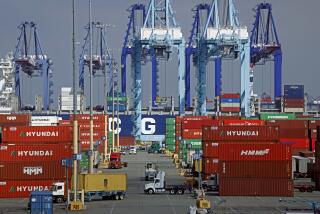1994-95: REVIEW AND OUTLOOK : ‘94/’95 TRENDS : Need the Keys to ‘95? Try These : Expanding Economy May Not Mean Jobs
- Share via
As 1994 was ending, we asked the distinguished members of the Times Board of Advisers to peer ahead into the new year and assess the prospects for the world, national, state and urban economies--and to offer their advice to business people and public leaders for 1995.
*
The nation’s economy experienced a modest but steady recovery in 1994. California’s economic picture was not as bright: Job losses continued, and unemployment rates were consistently higher than the national average.
However, there are signs that California’s economy will improve in 1995.
Unfortunately, if the newly elected Republican-controlled Congress has its way, the plight of the poor--particularly in urban areas--will probably get worse in spite of an improving economy. The “Contract With America” sounds an awful lot like President Reagan’s previous blueprint for getting America back on track. The outcome of his plan was an increase in the number of working poor and the number of people in poverty.
What many elected officials fail to recognize is that as we move into the 21st Century, it will be possible to make the economy grow without necessarily growing jobs. The result will be a growing labor supply with decreasing possibilities of being absorbed into the labor market. In such circumstances, attempts to take income support away from welfare recipients after two years on the expectation they can find work are both naive and cruel.
The challenge will be for officials to recognize that a growing economy will not necessarily mean a better quality of life for millions of Americans. Policies designed to encourage the informal economy may be our best bet to re-establish a safety net for those who are unlikely to be included in the work force of tomorrow.
More to Read
Inside the business of entertainment
The Wide Shot brings you news, analysis and insights on everything from streaming wars to production — and what it all means for the future.
You may occasionally receive promotional content from the Los Angeles Times.










